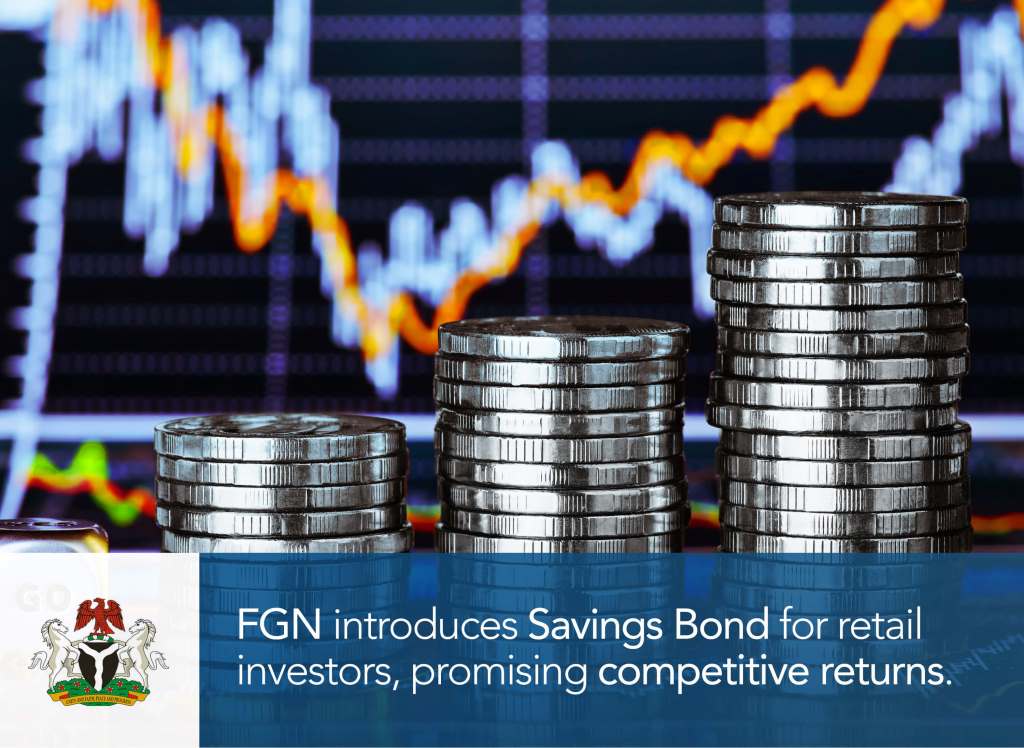Economy
Corporate Bond Market to Rebound as FGN Securities Yields Drop

The economic and financial market developments in the last few months in Nigeria point to a possible rebound of activities in the Corporate Bond Market (CBM) very soon.
The CBM had experienced a lull in activities in the last few years because of unfavourable economic and market conditions.
The recent events in Nigeria are changing the unfavourable conditions that have limited the growth of the CBM.
The recent drop in the yields on the Federal Government of Nigeria (FGN) securities, particularly the Nigerian Treasury Bills (NTB), creates an opportunity for the growth of activities in the CBM.
The improvement in the macroeconomic environment in Nigeria and the strategy of the Debt Management Office (DMO) to restructure the debt portfolio of the FGN were primary drivers of the drop in yield.
The need to curb the high inflation rate and maintain foreign exchange stability was responsible for the high NTB yields.
Consequently, there was a lull in activities in the CBM as companies could not compete with the high yields on the 364-day NTB.
Accordingly, most companies opted for Commercial Papers (CP) to raise short-term funds as bridge finance. The average yield on the 364-day NTB between January 2017 and November 2017 stood at 22.16% with the highest yield of 23.41% recorded in 19 April 2017. The high yields crowded out the corporate borrowers from the debt market.
According to data from FMDQ OTC Securities Exchange as at November 1, 2017, only two corporate bonds have so far been issued in 2017.
The two Corporate Bonds are: 17 percent Mixta Real Estate Plc January 2022 Bond and 18.25 percent Dufil September 2022 Bond.
In another development, a review of the latest Purchasing Managers’ Index (PMI) report that the Central Bank of Nigeria (CBN) published for the month of October 2017 shows that economic activities in the manufacturing and non-manufacturing sectors expanded further.
A PMI below the 50 points’ level suggests a decline in business activity while a PMI higher than the 50 points level suggests an expansion. When the PMI is at the 50 points’ level, it means that the degree of business activity in the economy is unchanged.
The Composite Manufacturing Index (CMI) expanded for the seventh consecutive month to stand at 55.0 points.
The Composite Non-Manufacturing Index (CNMI) also expanded for the sixth consecutive month to 55.3 points in October 2017 from 54.9 points in September 2017.
The increase in the PMI is also an indication of expected business expansion in the short-to-medium term which will require more financing.
The consensus forecasts for the Nigerian economy are that the Gross Domestic Product (GDP) will continue to grow. Although the GDP growth rates of the International Monetary Fund (IMF) for Nigeria from 2017 to 2020 are conservative, they are in the positive region.
Both FSDH Research and the Budget Office of the Federation believe the growth rates in the economy between 2017 and 2020 will remain strong, ranging from 2 percent to 7 percent. This means that more business investments will be undertaken.
Our analysis of the data released by the Nigerian Bureau of Statistics (NBS) on the Nigerian GDP (Expenditure and Income Approach) as at Q4, 2016 shows that consumption expenditure of households in Nigeria rose in 2016 compared with 2015.
The total consumption expenditure of households rose by 11.87 percent from N74.41trn in 2015 to N83.25trn in 2016.
FSDH Research expects the households’ consumption expenditure to continue to rise as the outlook for the Nigerian economy remains positive and consumer sentiments improve. The growth in the households’ consumption will also drive investments from firms to meet the growing demand.
FSDH Research believes that the capital requirement for these investments will exceed what companies can generate from internal cash flow. These companies will need external funding and with the expected drop in yields, corporate bond will be an attractive source of raising non-permanent long-term capital to meet the investment needs of firms.
Economy
LIRS Urges Taxpayers to File Annual Returns Ahead of Deadline

By Modupe Gbadeyanka
All individual taxpayers in Lagos State have been advised to file their annual tax returns ahead of the March 31 deadline.
This appeal was made by the Lagos State Internal Revenue Service (LIRS) in a statement issued by its Head of Corporate Communications, Mrs Monsurat Amasa-Oyelude.
The notice quoted the chairman of LIRS, Mr Ayodele Subair, as saying that timely filing remains both a constitutional and statutory obligation as well as a civic responsibility.
The statutory filing requirement applies to all taxable persons, including self-employed individuals, business owners, professionals, persons in the informal sector, and employees under the Pay-As-You-Earn (PAYE) scheme.
In accordance with Section 24(f) of the 1999 Constitution of the Federal Republic of Nigeria, Sections 13 &14(3) of the Nigeria Tax Administration Act 2025 (NTAA), every individual with taxable income is required to submit a true and correct return of total income from all sources for the preceding year (January 1 to December 31, 2025) within 90 days of the commencement of a new assessment year.
“Filing of annual tax returns is not optional. It is a legal requirement under the Nigeria Tax Administration Act 2025. We encourage all Lagos residents earning taxable income to file early and accurately.
“Early and accurate filing not only ensures full adherence with statutory requirements, but supports effective monitoring and forecasting, which are critical to Lagos State’s fiscal planning and long-term sustainability,” Mr Subair stated.
He further noted that failure to file returns by the statutory deadline attracts administrative penalties, interest, and other enforcement measures as prescribed by law.
To enhance convenience and efficiency, all individual tax returns must be submitted electronically via the LIRS eTax portal at https://etax.lirs.net. The platform enables taxpayers to register, file returns, upload supporting documents, and manage their tax profiles securely from anywhere.
In keeping with global best practices, Mr Subair reiterated that LIRS continues to prioritise digital tax administration and taxpayer support services. He affirmed that the LIRS eTax platform is secure and accessible worldwide. Taxpayers requiring assistance may visit any of the LIRS offices or other channels.
Economy
NNPC Targets 230% LPG Supply Surge to 5MTPA Under Gas Master Plan 2026

By Adedapo Adesanya
The Nigerian National Petroleum Company (NNPC) Limited has said the Gas Master Plan 2026 targets over 230 per cent scale-up of Liquefied Petroleum Gas (LPG) supply from 1.5 million tonnes per annum (MTPA) to 5 MTPA this year.
The Executive Vice President for Gas, Power and New Energy at NNPC, Mr Olalekan Ogunleye, unveiled the strategic direction of the NNPC Gas Master Plan 2026, outlining an aggressive expansion drive to position Nigeria as a regional and global gas powerhouse.
Mr Ogunleye delivered the keynote address at the 2026 Lagos Energy Week, organised by the Society of Petroleum Engineers (SPE), where he detailed plans to accelerate gas development, deepen infrastructure and significantly scale domestic supply.
According to him, the Gas Master Plan targets a scale-up of LPG or cooking gas supply from 1.5 MTPA to 5 MTPA, alongside expanded feedstock for Mini-LNG and Compressed Natural Gas (CNG) projects.
“The NNPC Gas Master Plan 2026 is a blueprint to unlock Nigeria’s vast gas potential and translate it into tangible economic value,” Mr Ogunleye said.
He added that the strategy would also drive exponential growth in Gas-Based Industries, GBIs, strengthening local manufacturing, fertiliser production and power generation.
“Our renewed focus is on turning abundant gas resources into inclusive economic growth and improved quality of life for Nigerians,” he stated.
Mr Ogunleye said the plan aligns with the Federal Government’s Decade of Gas initiative and the presidential production targets of achieving 10 billion cubic feet per day by 2027 and 12 BCF/D by 2030.
Industry leaders at the event, including executives from Chevron Corporation, Esso Exploration and Production Nigeria Limited, Midwestern Oil and Gas Company Limited, Abuja Gas Processing Company and Shell Nigeria Gas, commended the plan and praised Ogunleye’s leadership in driving implementation excellence.
The new blueprint signals NNPC’s determination to anchor Nigeria’s energy transition on gas, leveraging infrastructure expansion and domestic utilisation to consolidate the country’s status as Africa’s largest gas reserve holder.
Economy
Shettima Blames CBN’s FX Intervention for Naira Depreciation

By Adedapo Adesanya
Vice President Kashim Shettima has attributed the Naira’s recent depreciation to the intervention of the Central Bank of Nigeria (CBN) in the foreign exchange (FX) market, stating that the currency could have strengthened to around N1,000 per Dollar within weeks if the apex bank had allowed market forces to prevail.
The local currency has dropped over N8.37 on the Dollar in the last week, as it closed at N1,355.37/$1 on Tuesday at the Nigerian Autonomous Foreign Exchange Market (NAFEM), after it went on a spree late last month and into the early weeks of February.
However, speaking on Tuesday at the Progressive Governors’ Forum (PGF), Renewed Hope Ambassadors Strategic Summit in Abuja, the Nigerian VP said the intervention was to ensure stability.
“In fact, if not for the interventions by the Central Bank of Nigeria yesterday, the 1,000 Naira to a Dollar we are going to attain in weeks, not in months. But for the purpose of market stability, the CBN generously intervened yesterday.
“So, for some of my friends, especially one of our party leaders who takes delight in stockpiling dollars, it is a wake-up call,” the vice president said.
He was alluding to CBN buying US Dollars from the market to slow down the rapid rise of the Naira.
Latest information showed that last week, the apex bank bought about $189.80 million to reduce excess Dollar supply and control how fast the Naira was gaining value.
The move was aimed at preventing foreign portfolio investors from exiting Nigeria’s fixed-income market, as large-scale sell-offs could heighten demand for US Dollars, intensify capital flight, and exert further pressure on the exchange rate.
Amid this, speaking after the 304th meeting of the monetary policy committee (MPC) of the CBN on Tuesday, Governor of the central bank, Mr Yemi Cardoso, said Nigeria’s gross external reserves have risen to $50.45 billion, the highest level in 13 years.
This strengthens the country’s foreign exchange buffers, enhances the apex bank’s capacity to defend the Naira when needed, and boosts investor confidence in the stability of the Nigerian FX market.
-

 Feature/OPED6 years ago
Feature/OPED6 years agoDavos was Different this year
-
Travel/Tourism10 years ago
Lagos Seals Western Lodge Hotel In Ikorodu
-

 Showbiz3 years ago
Showbiz3 years agoEstranged Lover Releases Videos of Empress Njamah Bathing
-

 Banking8 years ago
Banking8 years agoSort Codes of GTBank Branches in Nigeria
-

 Economy3 years ago
Economy3 years agoSubsidy Removal: CNG at N130 Per Litre Cheaper Than Petrol—IPMAN
-

 Banking3 years ago
Banking3 years agoSort Codes of UBA Branches in Nigeria
-

 Banking3 years ago
Banking3 years agoFirst Bank Announces Planned Downtime
-

 Sports3 years ago
Sports3 years agoHighest Paid Nigerian Footballer – How Much Do Nigerian Footballers Earn
















